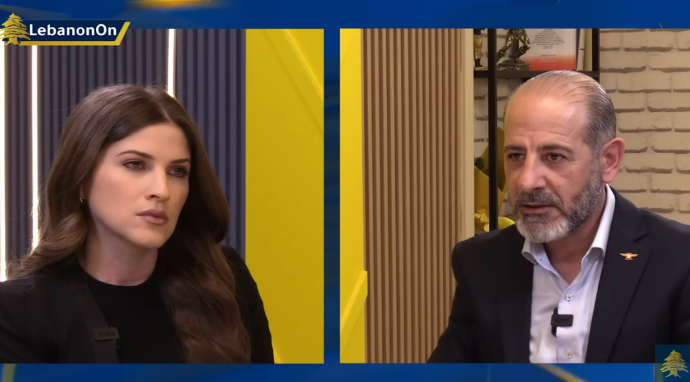Lebanon at the crossroads: Ibrahim Mrad’s bold blueprint for confrontation and reform
BEIRUT — In an extensive interview with Lebanon On, Ibrahim Mrad, president of the Universal Syriac Union Party (USUP), laid out an ambitious and multifaceted plan for Lebanon’s future—one that envisions a nation reformed through federalism, total control over militias and their weapons, and renewed diplomatic efforts toward regional peace – which would potentially also mean a peace treaty and normalizing diplomatic relations with southern neighbor Israel.
The conversation took a pointed turn as Mrad addressed the role of non-state actors in Lebanon’s security landscape. “Hezbollah and other militias have long disrupted our national security,” he asserted. He stressed that the unchecked proliferation of weapons among these groups poses a serious threat not only to state authority but also to regional stability. “Disarming militias and ensuring that weapons do not fall into the wrong hands is not only essential for national security but also for paving the way toward lasting peace,” Mrad explained. He called for comprehensive disarmament measures, highlighting that such steps would be crucial for dismantling the power structures that allow these militias to thrive.
A call for confrontation sparks national debate
In the candid yet cutting interview posted on the Lebanon On YouTube channel on April 3, Mrad went even further, issuing a stark call to arms against Hezbollah, the Iran-backed Shiite militant group. He declared that political avenues had been exhausted and advocated for direct military confrontation to reclaim Lebanon’s sovereignty.
“With Iran’s support, money, and weapons, Hezbollah is stronger than all the Lebanese,” Mrad stated. He emphasized the necessity of besieging the organization within its strongholds, declaring, “We should go there and confront it.” His remarks marked a sharp departure from the more cautious rhetoric often used by political leaders in Lebanon when addressing Hezbollah’s over-dominant role in the country.
In addition, Mrad denounced Hezbollah for violating key ceasefire agreements and flouting international law. He accused the group of breaking the ceasefire by launching missiles and failing to sign critical international resolutions—namely UNSC Resolutions 1701 and 1559—which, he argued, were essential for maintaining stability. “Their refusal to abide by these resolutions is like a declaration of surrender to lawlessness,” he warned. “I won’t wait for the Lebanese army or diplomacy to step in; decisive action must be taken now.” Mrad further claimed that Hezbollah fighters not only disrupt everyday life in northern Lebanon but also engage in drug trafficking and meddle in the internal affairs of Syria, Iran, the Gulf States, and Yemen. This, he argued, underpins why Hezbollah continues its destabilizing activities in the broader region.
The interview ignited swift and intense reactions. Mrad was summoned by Lebanon’s Criminal Investigation Branch for questioning regarding his statements. Meanwhile, Hezbollah and its supporters disseminated edited versions of his remarks on social media platforms, fueling online outrage and leading to death threats against him. In response to the backlash, Mrad released a video clarifying his position. He expressed regret that his original interview had been misrepresented and reaffirmed his stance as a defender of the Shiite community, while maintaining his call for a just and sovereign Lebanese government.
Diplomacy and the road to peace
On the international front, Mrad emphasized that meaningful peace talks must be anchored in firm adherence to United Nations resolutions. “Our path forward must be defined by dialogue and strict adherence to international norms,” he said. “Peace talks with Israel cannot move forward until we honor the UN resolutions that seek to bring stability to the region.” He pointed out that despite historical tensions, there remains an urgent need to revive diplomatic engagement with Israel, arguing that open channels of communication are vital to resolving long-standing conflicts.
The Budapest Conference: a catalyst for change
The Budapest Conference, held last year, was highlighted as a seminal moment in the region’s journey toward stability. “The Budapest Conference provided us with a roadmap—a platform that brought together diverse regional stakeholders committed to reform,” Mrad remarked. He added that the conference’s outcomes offered a clear set of guidelines for initiating reforms in governance, security, and international relations. “We must build on that foundation to engage with our neighbors constructively,” he insisted, underscoring the conference’s role in shaping a strategic vision for Lebanon and its regional partners.
Beyond the structural and security challenges, Mrad also shed light on the need for a comprehensive overhaul of Lebanon’s internal government services. “Improving our internal services isn’t just a bureaucratic exercise—it’s about ensuring that every citizen has access to the support and resources they need,” he stated. He detailed proposals for modernizing public institutions, decentralizing administrative functions, and introducing more transparent governance practices. These measures, he argued, are essential for fostering both economic growth and social cohesion in a country that has long struggled with inefficiency and corruption.
Mrad’s vision is bold and comprehensive. “Our goal is a Lebanon where federalism empowers communities, militias are disarmed, and peace talks are not just a promise but a reality,” he concluded. His remarks resonated deeply in a nation where divisions have long hampered progress. By championing reforms across governance, security, and diplomacy, Mrad is calling on both policymakers and citizens to embrace change and work collectively toward a stable, equitable, and peaceful future.
In a region fraught with conflict and divided loyalties, Ibrahim Mrad’s articulated vision offers not only a blueprint for national renewal but also a rallying cry for unity. His commitment to reform, rooted in the principles of federalism and international cooperation, presents a clear alternative to the status quo—a future where Lebanon can emerge as a beacon of stability and progress in a turbulent part of the world.



















